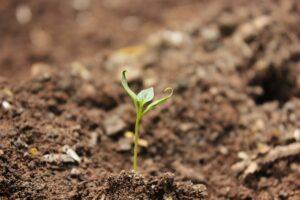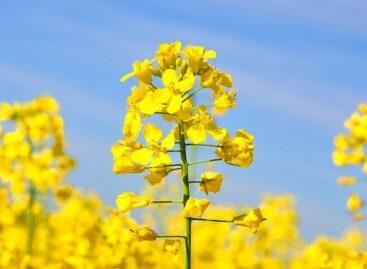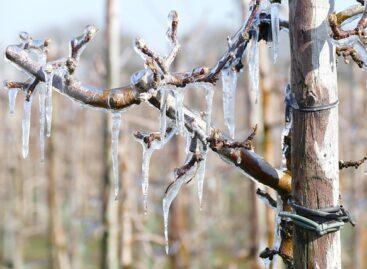On the occasion of World Soil Day, the ecological research institute draws attention to the alarming rate of reduction of topsoil
The Ecological Agricultural Research Institute (ÖMKi) draws attention to the importance of healthy soils and the alarming rate of reduction of topsoil in its statement published on Tuesday on the occasion of World Soil Day.

(Photo: Pixabay)
“Our soils are under threat, due to, among other things, expanding cities, deforestation, erosion, pollution, overgrazing, climate change and the resulting extreme weather phenomena. As a result of unsustainable land use and farming practices, we are losing topsoil at an alarming rate: the According to the global data of the Food and Agriculture Organization of the United Nations (FAO), while soil formation does not exceed an average amount of 1 ton/hectare/year, the rate of soil erosion is 30-100 tons/hectare/year” – says ÖMKi’s announcement sent to MTI on Tuesday . According to the announcement, in Hungary, water erosion endangers a third of the agricultural land, wind erosion affects 1.4 million hectares, and in total we lose 80-110 million cubic meters of soil every year. The decrease in the organic matter content of the soil (as a result of too intensive tillage, the removal and non-replacement of organic matter produced in agricultural areas) and the impoverishment of soil life lead to the deterioration of the soil’s physical structure, dusting and the lack of stable soil crumbs (aggregates), the researchers point out.
They draw attention to the fact that around a third of the soils worldwide can no longer be used for agricultural production
These have been degraded due to improper use, erosion, sometimes salinization, structural deterioration, acidification, some kind of contamination or the leaching of nutrients. According to estimates, the economic cost of soil degradation for the European Union is in the order of tens of billions of euros every year – they wrote. “Soil degradation causes food shortages, higher food prices, and in the long term, the destruction of the ecosystems necessary for the survival of our lives. We cannot afford this level of degradation, neither because of the Earth’s growing population and food demand, nor because of the protection of other species,” the ecologists emphasize.
Soil is home to nearly 60 percent of Earth’s species, stores large amounts of carbon and water, and provides 95 percent of food production
The formation of two to three centimeters of topsoil can take up to 1,000 years, so when calculated on a human scale, soil is not considered a renewable resource. According to the announcement, up to 10 billion organisms can be found in one gram of soil. That’s more than the number of people living on the planet. In addition, only 1 percent of the microscopic organisms have been identified so far – they note. They add that soil stores more carbon than the atmosphere and all the world’s plants combined (including forests). Healthy soil can help prevent floods and mitigate the effects of drought: it can store up to one and a half Olympic swimming pools of water per hectare. The soil thus plays a key role not only in our food supply, but also in the fight against climate change.
The announcement emphasizes that the sustainable management of the resources inherent in the soil plays a key role in organic farming
The basic objective of organic farming is to preserve soil health and maintain long-term soil fertility, to achieve which organic farmers apply several good practices, they point out. Organic farmers maintain and improve soil fertility and biological activity in a natural way by using organic manure, compost, green manure and ground cover plants, by incorporating nitrogen-fixing butterfly plants into the crop rotation, by rational soil cultivation and plant diversification. Dóra Drexler, the managing director of ÖMKi, reports that the research institute has been carrying out tests related to soil cultivation for years. “In the Csoroszlya Farm area in Sári, for example, we have been conducting agronomic and soil cultivation experiments since 2021. Our first results show that the biological parameters of the soil, i.e. soil life, react quickly to changes in the cultivation method,” explains the executive, who also says that this year the Földfizikai and Space Science Research Institute and the Applied Earth Science Research Institute of the University of Miskolc, they started geophysical investigations in order to more effectively measure the effects of tillage. The specialists of the research institute also provide advice on maintaining the healthy functioning of the soil, more information about which is available on the website of the ÖMKi (www.biokutatas.hu). The purpose of World Soil Day (WSD – World Soil Day), supported by the Food and Agriculture Organization of the United Nations and FAO, is to draw attention to the importance of topsoil and to support the sustainable management of soil resources.
MTI
Related news
Rapeseed prices fell worldwide and domestically
🎧 Hallgasd a cikket: Lejátszás Szünet Folytatás Leállítás Nyelv: Auto…
Read more >ENAR data reconciliation for cattle, sheep and goat, pig and poultry farmers is underway until the end of March
🎧 Hallgasd a cikket: Lejátszás Szünet Folytatás Leállítás Nyelv: Auto…
Read more >Related news
(HU) METRO Gasztro Fesztivál a SIRHA Budapesten – Élmény, inspiráció és valódi megoldások a HoReCa-szakmának
🎧 Hallgasd a cikket: Lejátszás Szünet Folytatás Leállítás Nyelv: Auto…
Read more >Fidelity: What awaits China in the Year of the Horse?
🎧 Hallgasd a cikket: Lejátszás Szünet Folytatás Leállítás Nyelv: Auto…
Read more >









